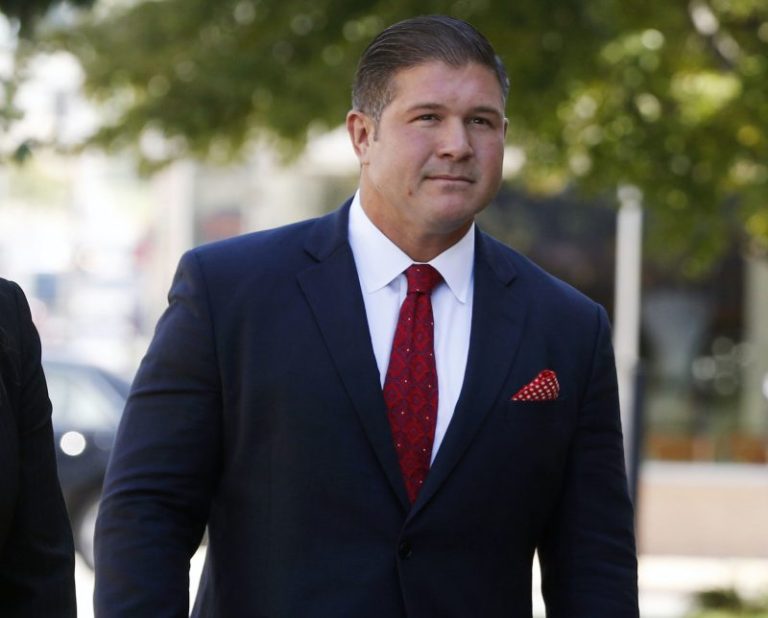A Republican political strategist was convicted of illegally helping a Russian businessman contribute to Donald Trump’s presidential campaign in 2016.
Jesse Benton, 44, was pardoned by Trump in 2020 for a different campaign finance crime, months before he was indicted again on six counts related to facilitating an illegal foreign campaign donation. He was found guilty Thursday on all six counts.
Elections “reflect the values and the priorities and the beliefs of American citizens,” Assistant U.S. Attorney Michelle Parikh said in her closing argument this week. “Jesse Benton by his actions did damage to those principles.”
The evidence at trial showed that Benton bought a $25,000 ticket to a September 2016 Republican National Committee (RNC) event on behalf of Roman Vasilenko, a Russian naval officer turned multilevel marketer. (Vasilenko is under investigation in Russia for allegedly running a pyramid scheme, according to the Kommersant newspaper; he could not be reached for comment.) The donation got Vasilenko a picture with Trump and entrance to a “business roundtable” with the future president.
Vasilenko connected with Benton through Doug Wead, an evangelical ally of the Bush family who was also involved in multilevel marketing. Vasilenko sent $100,000 to Benton, who was working for a pro-Trump super PAC at the time, supposedly for consulting services. Benton subsequently donated $25,000 to the RNC by credit card to cover the ticket.
Witnesses from the RNC and the firm hired to organize the event said they weren’t told Vasilenko was a Russian citizen. Benton said in an email to his RNC contact that Vasilenko was “a friend who spends most of his time in the Caribbean”; he described Vasilenko’s interpreter as “a body gal.” In fact, according to the testimony, Benton and Vasilenko had never met.
Benton argued that he followed the advice of his previous counsel, David A. Warrington, who has also represented Trump. Warrington testified that Benton contacted him at the time to ask if he could give a ticket to a political fundraiser to a Russian citizen. Warrington said he told Benton “there is no prohibition on a Russian citizen receiving a ticket to an event” and that “you can give your ticket that you purchased to a fundraiser to anybody.”
Prosecutors said Benton failed to tell Warrington that he was getting reimbursed by the Russian citizen for the donation. Benton asked for the advice only “to cover his tracks,” Parikh said.
Benton also claimed that he earned the $100,000 acting as a tour guide in Washington for Vasilenko, whose interest was not politics but self-promotion.
Wead — who died at age 75 last December after he was indicted with Benton — had previously discussed with Vasilenko the possibility of a photograph with Oprah Winfrey, Michelle Obama or Steven Seagal before suggesting Trump.
“If Oprah was available,” defense attorney Brian Stolarz said in his closing argument, “we wouldn’t even be here.”
Vasilenko posted the photograph of himself with Trump on Instagram with a banner that said “Two Presidents” and advertised his own company. He said Benton “delivered on what he was asked to do,” which was “get him in a picture with a celebrity” so Vasilenko “could brag on Instagram.” To Vasilenko, he said, Trump was not a politician but “the guy who used to be on ‘The Apprentice.’ ” At the roundtable, he said Trump appeared only briefly and “just talked about polls.”
Stolarz emphasized that there was no evidence Vasilenko ever engaged with Trump outside the single event, and no evidence the RNC ever returned the donation. Witnesses from the RNC said they were in the dark about the origin of the funds.
“He wants to be an influencer,” Stolarz said. “This is just shameless self-promotion from a guy who can afford to take this picture.”
But prosecutors said that once it was offered, Vasilenko saw the value of an introduction to Trump. He was running for parliament in Russia at the time, according to the Justice Department, and after Trump’s election was invited on Russian television.
“He’s sophisticated,” Assistant U.S. Attorney Michelle Wasserman told jurors. “He got access to someone he helped elect.”
Benton’s defense downplayed the $25,000 as “nothing” in an election that cost billions.
“This is not some nefarious backroom scheme to funnel millions of dollars from Russia,” he said.
Prosecutors argued that every dollar counted in a race where Democrat Hillary Clinton was far ahead in fundraising, and that Benton knew Trump needed money at the time.
Stolarz said Benton was also paid to organize a charity dinner Vasilenko attended on his U.S. trip, which prosecutors dismissed as a cheap meal at a chain restaurant.
“They may try to downplay it, but Maggiano’s is good,” Stolarz said.
Benton began his career on the GOP’s libertarian fringe as an aide to former congressman Ron Paul (R-Tex.), whose granddaughter is Benton’s wife. He gained mainstream credibility helping Paul’s son, Rand Paul (R-Ky.), win a Senate seat in 2010 and was hired by Senate Minority Leader Mitch McConnell’s (R-Ky.) 2014 reelection campaign.
But Benton resigned before that election amid an investigation into whether an Iowa state senator was bribed to support Ron Paul in the 2012 presidential race. Benton was convicted in May 2016 of conspiracy and involvement in filing of false campaign finance reports — not long before the new scheme began.
“He knew the law,” Wasserman said. “He knew the rules.”
After the verdict, Stolarz said Benton “maintains his innocence and plans to appeal.”
Robyn Dixon contributed to this report.

